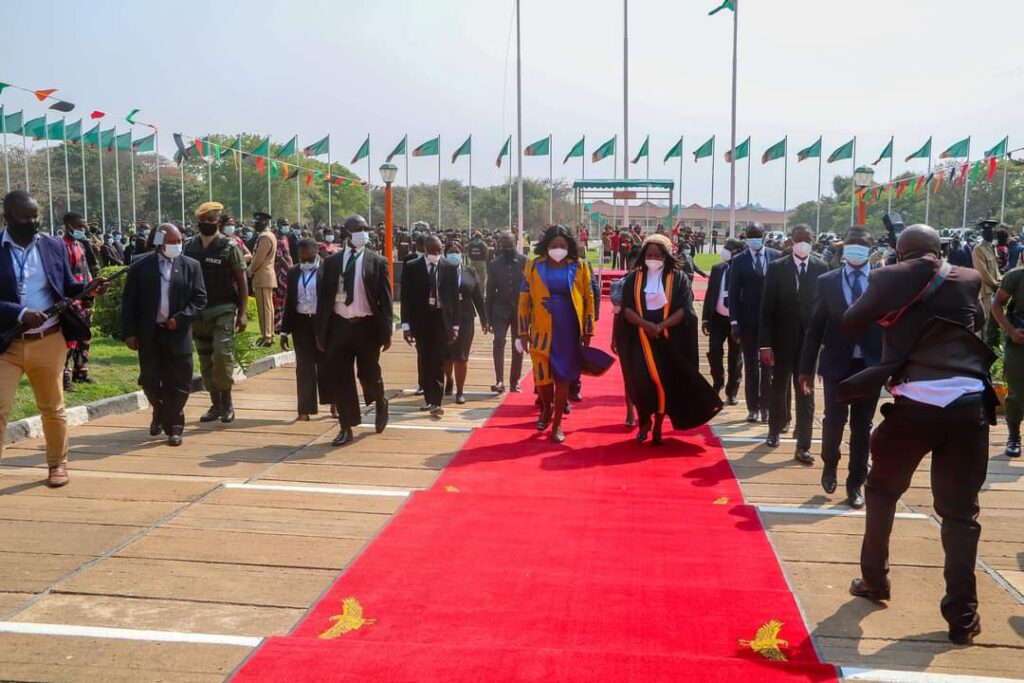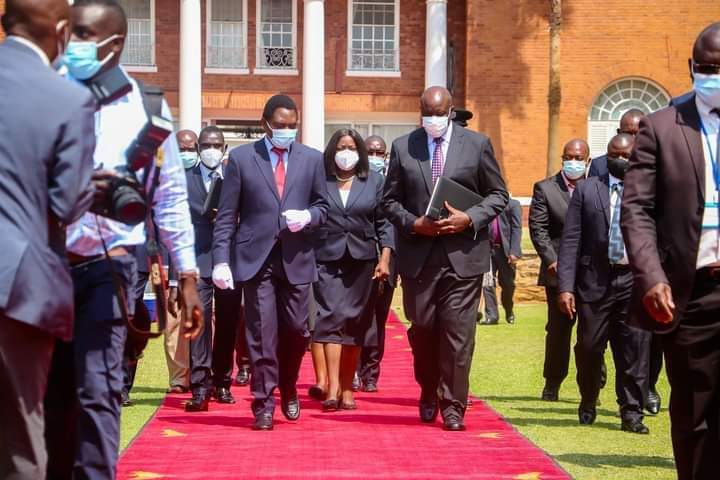Zambia: Vice President Mutale Nalumango’s modest upbringing should help break stereotypes and the entrenched cycle of female exclusion

Mutale Nalumango (pictured centre) became Zambia’s Vice President following the election of President Hakainde Hichilema in August 2021. Although a veteran in Zambian politics, she remains less known beyond the country’s borders. From Lusaka, Journalist and author Reginald Ntomba, tells us more about Zambia’s second-in-command.
For a country with one of the lowest female leadership representations in the world, and where positions of power across all fields are dominated by men, the choice of Mutale Nalumango as Zambia’s Vice President, barely stretches far. It is, however, highly applauded.
The 66-year-old is only the second woman to hold the high post in the country’s 57 years of independence. The other was her predecessor Inonge Wina, whose former ruling party the Patriotic Front (PF) lost the August 2021 election.
But under Hichilema the country has trod one step further with the appointment of both the Speaker of Parliament and her Deputy, who are also women. But while such efforts towards female empowerment are worth highlighting, there are increased calls for more to be done to break the entrenched cycle of exclusion. And many advocates believe Mutale’s upbringing and background should help to inspire that change.
“One thing I remember my mother for is that she never stopped us from going to school despite all the struggles,” she recalls. The lack of education due to some negative societal norms is one of the key issues that has held Zambian women from taking up leadership roles. While the country’s constitution rules that political candidates should hold a minimum Grade 12 school certificate, most girls in the country – particularly in rural areas, drop out of school before secondary school age.
Mutale lost her father at the young age of six and in those days it was (and still is) common for some parents to marry off their daughters, because of the belief that girls do not have much of a future even if they chose to pursue an education. But Mutale’s mother made sure to send her to school. She was one of just three girls from her village who made it to secondary school.

Born on 1 January 1955 in Kaputa, one of Zambia’s remotest districts in the north, bordering the Democratic Republic of Congo, Mutale later trained as a teacher of History and English and served in the classroom for 25 years, and she has over those long years, contributed immensely to raising another generation of Zambians that have gone on to become productive members of society.
Having taught in different parts of the country, Mutale has many people who proudly refer to her on social media platforms as “my former teacher”. Now, she is not just a former teacher, but one who fought her way to the upper echelons of Zambia’s political leadership and demonstrated just what a difference educating girls and enabling women to participate in governance can make.
“I grew up in a proper village,” she said in a television interview two months before the August general election that brought her party the United Party for National Development (UPND) to power. Both Mutale and her boss President Hakainde Hichilema are products of the village and speak fondly of their experience growing up in the hardship associated with village life. She thinks having the top two of the country’s leaders from this background is “a promotion of the village.”
While working as a teacher, she was involved in trade union politics and rose to the position of vice president of the Secondary School Teachers Union of Zambia (SESTUZ). Having done her fair share of teaching, in 2001 she retired from the classroom and ran for Parliament in her home district which she won on the first attempt under the ticket of the then governing Movement for Multiparty Democracy (MMD).
Zambia’s third president Levy Mwanawasa appointed her to several ministerial portfolios including Information, Labour, and Education. In the 2006 election, she retained her parliamentary seat and left Cabinet, becoming the first female Deputy Speaker of the Zambian legislature, a position she held for five years.
Mutale’s star indeed began to shine. The rural girl went on to become a teacher, trade unionist, minister and Deputy Speaker. For many wellwishers, her star could only keep rising. But as the country went to another election in 2011, the northern part of the country had turned over to the then opposition Patriotic Front (PF) which dominated the region under the populist campaign of its leader Michael Sata. She lost her seat in that election and her party MMD lost power too.
This loss could have marked the end of her political career. But she also says it was tempting to join the victorious party and was even offered the position of ambassador. She did not agree with the policies of the new government and brushed aside the overtures. Meanwhile, her party was crumbling, dogged by infighting, factionalism and the general despondency associated with losing power, the glue that bound the members together.
Frustrated by what was happening in MMD, she had to find a new political home. She joined the UPND in 2013 where she was appointed national chairperson. With the MMD virtually dead, the UPND became the largest opposition party that was breathing heavily on the PF. That didn’t bring the opposition any love, much less herself.
For instance, when she was campaigning in the PF-controlled north in January 2015, she and her entourage that included former first lady Maureen Mwanawasa was attacked by PF supporters who stoned her chopper and prevented it from landing to pick up her team. The video of the two women running for their dear lives remains a vivid reminder of what opposition parties in Africa have to endure to win power from governing parties determined to retain it.
If Mutale’s star appeared to dim in 2011 when she lost her seat and her party kicked out of power, ten years later it is shining again. In February 2021, she was elected vice president of the UPND, deputizing Hichilema who would in six months make his sixth attempt at the presidency. But before that, she was faced with the difficult task of holding the party together in 2017 when Hichilema was locked up for four months on a fake treason charge.
When it came to choosing a running mate for this year’s election, the loudest voices lobbying for Mutale were from those who didn’t even have the power to make the decision as this is the preserve of the presidential candidate – which both main candidates kept a secret until the very last minute.

On 19 May 2021, Hichilema arrived at the presidential nomination centre flanked by Mutale as his running mate. There were cheers. The president’s choice was overwhelmingly endorsed as many felt she had rightly earned the position.
A reverend of the Pentecostal faith, a wife and mother of three, the teacher-turned-politician was on 24 August sworn-in as Zambia’s 14th Vice President and only the second woman in the position, succeeding another woman Inonge Wina, who, like Mutale, had also served as national chairperson and vice president of her political party before rising to be the country’s second in command.
Going by his early appointments in the first one-and-half months, Hichilema stood accused of creating a ‘boys club’ as he packed ‘his circle of men.’ In his defence, he referred to Mutale, the Speaker of the National Assembly Nellie Mutti, Deputy Speaker Attractor Chisangano and the four female Cabinet ministers as examples of his commitment to women leadership. He regretted the small number of women that made it as MPs from which Cabinet is picked. The new assembly only has 14.6% women parliamentarians.
In October, the president proposed that as a long-term solution to addressing the imbalance, legislation could be introduced to reserve a certain quota for women in all positions of decision-making. While acknowledging the dilemma of too few women MPs, some commentators have still insisted that the President appoints more women in other positions, something he has promised to do as he rolls out other appointments of Permanent Secretaries, ambassadors and parastatal boards.









